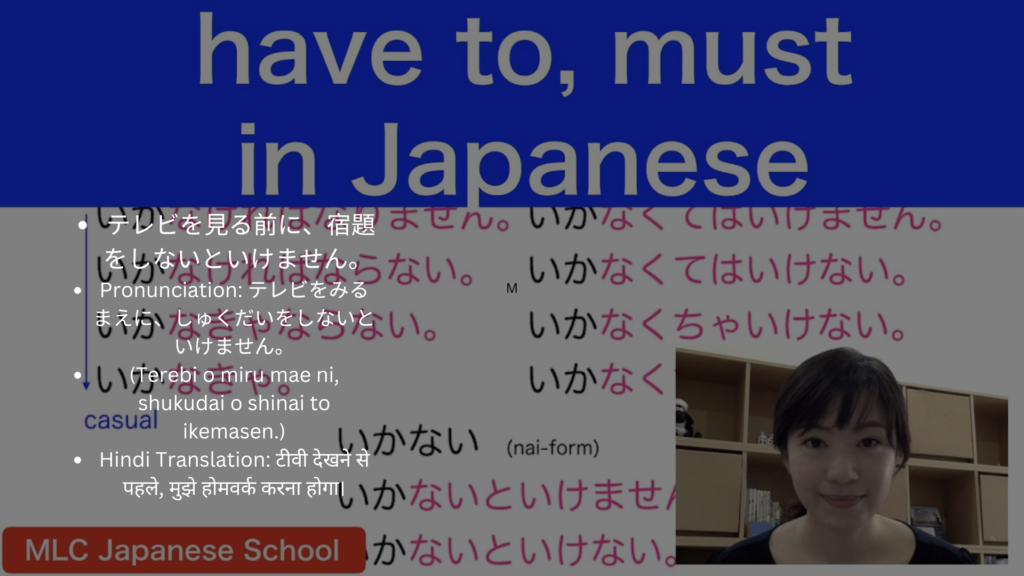Mastering 〜ないといけません (nai to ikemasen) in Japanese Grammar: An Extensive Guide with Examples
Mastering 〜ないといけません (nai to ikemasen) in Japanese Grammar: An Extensive Guide with Examples
Estimated reading time: 4 minutes
こんにちは (Kon’nichiwa)! Welcome to our Japanese language blog, where we explore the intricacies of Japanese grammar. Today, we will dive into the phrase 〜ないといけません (nai to ikemasen), a critical expression for conveying necessity or obligation, meaning “must” or “have to.” This phrase is essential for expressing what one must do in Japanese. Let’s break down its usage, structure, and provide some humorous examples to make your learning experience enjoyable!

Understanding 〜ないといけません (nai to ikemasen)
Sentence Structure
The structure of 〜ないといけません (nai to ikemasen) is straightforward:
- Start with the negative form of a verb (〜ない, nai).
- Add といけません (to ikemasen) to indicate necessity or obligation.
Examples with Different Verbs
- Verb: 食べる (たべる, taberu) – to eat
- Negative form: 食べない (たべない, tabenai)
- Combined: 食べないといけません (たべないといけません, tabenai to ikemasen) – Must eat / Have to eat
- Verb: 行く (いく, iku) – to go
- Negative form: 行かない (いかない, ikanai)
- Combined: 行かないといけません (いかないといけません, ikanai to ikemasen) – Must go / Have to go
- Verb: 見る (みる, miru) – to watch/see
- Negative form: 見ない (みない, minai)
- Combined: 見ないといけません (みないといけません, minai to ikemasen) – Must watch / Have to watch
Pronunciation Guide Using Hindi Alphabets
- 食べないといけません (tabenai to ikemasen) – ताबेनाई तो इकेमासेन
- 行かないといけません (ikanai to ikemasen) – इकानाई तो इकेमासेन
- 見ないといけません (minai to ikemasen) – मिनाई तो इकेमासेन
Example Sentences with Humor
- 食べないといけません (たべないといけません, tabenai to ikemasen) – Must eat
- Example: お母さんが言った、野菜を食べないといけませんよ!
- Pronunciation: おかあさんがいった、やさいをたべないといけませんよ!(Okaasan ga itta, yasai o tabenai to ikemasen yo!)
- Hindi Translation: माँ ने कहा, आपको सब्जियाँ खानी होंगी!
- Humorous Twist: जब आप अपने दोस्त की पार्टी में केवल केक खाना चाहते हैं, लेकिन माँ ने सब्जियाँ खाने की सख्त हिदायत दी है!
- 行かないといけません (いかないといけません, ikanai to ikemasen) – Must go
- Example: 明日、どうしても学校に行かないといけません。
- Pronunciation: あした、どうしてもがっこうにいかないといけません。(Ashita, doushitemo gakkou ni ikanai to ikemasen.)
- Hindi Translation: कल, मुझे किसी भी हालत में स्कूल जाना होगा।
- Humorous Twist: जब आप जानते हैं कि स्कूल में सिर्फ टेस्ट है और आपकी सबसे प्यारी मूवी कल ही रिलीज हो रही है!
- 見ないといけません (みないといけません, minai to ikemasen) – Must watch
- Example: 先生が言った、このドキュメンタリーを見ないといけません。
- Pronunciation: せんせいがいった、このどきゅめんたりーをみないといけません。(Sensei ga itta, kono dokyumentarii o minai to ikemasen.)
- Hindi Translation: शिक्षक ने कहा, आपको यह दस्तावेज़ी देखनी होगी।
- Humorous Twist: जब आप सोचते हैं कि यह एक मजेदार मूवी है लेकिन यह बोरिंग दस्तावेज़ी निकली!
Usage and Exceptions
General Usage
The phrase 〜ないといけません (nai to ikemasen) is used to express that something is necessary or obligatory. It is often used in both formal and informal contexts to indicate that an action must be taken.
Exceptions
While 〜ないといけません (nai to ikemasen) is a standard way to express necessity, in casual speech, it can be shortened to 〜ないとダメ (nai to dame) or 〜なきゃ (nakya). These forms are less formal but commonly used in everyday conversation.
More Examples for Clarity
- 宿題をしないといけません (しゅくだいをしないといけません, shukudai o shinai to ikemasen) – Must do homework
- Example: テレビを見る前に、宿題をしないといけません。
- Pronunciation: テレビをみるまえに、しゅくだいをしないといけません。(Terebi o miru mae ni, shukudai o shinai to ikemasen.)
- Hindi Translation: टीवी देखने से पहले, मुझे होमवर्क करना होगा।
- Humorous Twist: जब आप होमवर्क करने की कोशिश करते हैं और टीवी पर आपका पसंदीदा शो शुरू हो जाता है!
- 電話をかけないといけません (でんわをかけないといけません, denwa o kakenai to ikemasen) – Must make a phone call
- Example: 上司に電話をかけないといけません。
- Pronunciation: じょうしにでんわをかけないといけません。(Joushi ni denwa o kakenai to ikemasen.)
- Hindi Translation: मुझे अपने बॉस को फोन करना होगा।
- Humorous Twist: जब आप बॉस को फोन करते हैं और आपकी माँ पास आकर जोर-जोर से बात करने लगती है!
- 早く寝ないといけません (はやくねないといけません, hayaku nenai to ikemasen) – Must sleep early
- Example: 明日は早起きなので、早く寝ないといけません。
- Pronunciation: あしたははやおきなので、はやくねないといけません。(Ashita wa hayaoki na node, hayaku nenai to ikemasen.)
- Hindi Translation: कल जल्दी उठना है, इसलिए मुझे जल्दी सोना होगा।
- Humorous Twist: जब आप जल्दी सोने की कोशिश करते हैं और आपकी बिल्ली आपके चेहरे पर उछलती है!
Conclusion
In conclusion, mastering 〜ないといけません (nai to ikemasen) is crucial for expressing obligations and necessities in Japanese. This phrase is widely used in daily conversations, and understanding its structure and usage will significantly enhance your communication skills. Practice with our humorous examples to make learning more enjoyable and memorable.
-
Product on sale
 Japanese N3
Japanese N3₹42,600.00
₹62,600.00 -
Product on sale
 Japanese N4
Japanese N4₹24,300.00
₹32,600.00 -
Product on sale
 Japanese N5
Japanese N5₹18,300.00
₹24,300.00
Learn Languages Store
Vashi,
Email: services@learnlanguages.store










